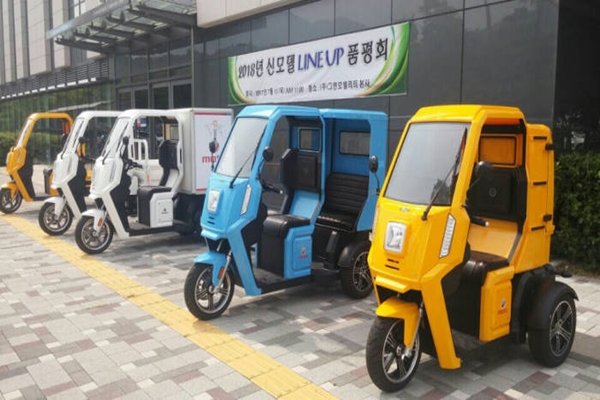South Korean small and medium company has developed IoT-based (Internet of Things) three-wheeled electric vehicles. Because location of these vehicles can be checked in real time, customers or employees from distributors can easily check information on shipping if these vehicles are used as delivery vehicles. As telecommunication technologies are combined with small electric vehicles that have excellent mobility and use of space, it is likely that they will be useful for distribution and transportation industries or car-sharing industries.
Green Mobility (CEO Oh Seung-ho) announced on the 6th that it will be introducing 6 different types of three-wheeled electric vehicles for shipping, dumpy truck, tour, and other purposes. Excluding batteries and electric motors, it developed platforms, design, and variety of power control devices with its own technologies.
Customers who are on budget can select either lead-acid battery or lithium-ion battery. Three-wheeled electric vehicles with lithium-ion batteries (4.6kWh ~ 5kWh) can drive up to 50 kilometers with just single charge and they use regular 200V cords for charging and it takes them about 2 hours to be completely charged.
Green Mobility is using Samsung SDI’s circular lithium-ion batteries and motors (72V/3000W) from Shanghai Motors. It has high competitive edge in price as it has designed battery packs, BMS (Battery Management System), controllers (invertors, converters), displayers, car design, and engineering design with its own technologies.

Green Mobility’s three-wheeled electric vehicles use ‘NB-IoT (Narrowband IoT)’ that provides national network and support Big Data management function related to operation and shipping. Drivers can check amount of charge left in batteries, status of batteries, and location of cars remotely as these electric vehicles are equipped with Green Mobility’s own telecommunication modules. Customers can check arrival time of delivery cars if these vehicles are used as delivery cars while distributors can check information such as status and troubleshooting of these vehicles through current status of vehicles and Big Data management.
Green Mobility designed its vehicles so that cargo box and seats are attachable and detachable in order to consider variety of different customers and minimized financial burden by dividing its vehicles into models with lithium-ion batteries ($5,316 to $6,202 (6 million KRW to 7 million KRW)) and models with lead-acid batteries ($3,544 to $4,430 (4 million KRW to 5 million KRW)). Its vehicles are also qualified to receive subsidy from South Korean Government worth $2,215 (2.5 million KRW).
“Unlike other three-wheeled electric vehicles, our vehicles’ gradability, generating power, and handling are smooth as regular vehicles due to our own motor and battery control algorithm technologies.” said CEO Oh Seung-ho of Green Mobility. “Variety of devices can be easily detached and attached so that consumers can use our vehicles for variety of purposes such as delivery, shipping, patrol, and distribution. Our vehicles can also be used as car sharing models due to IoT technologies.”
Staff Reporter Park, Taejoon | gaius@etnews.com